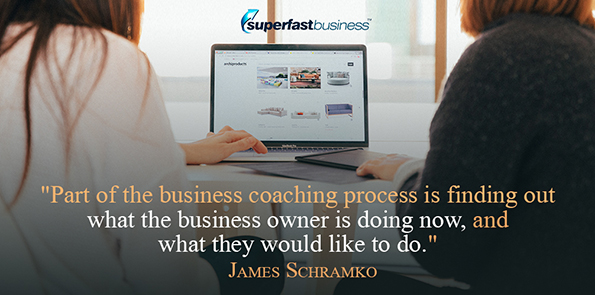What exactly does an online business coach do? How do they differ from business consultants? And do you really need one?
James Schramko breaks down his line of specialty by inviting one of his star coachees, Growth Labz’s Will Wang, to talk about the before and after of his business.
Podcast: Download (Duration: 25:33 — 23.5MB)
Get Notified Of Future Episodes Apple Podcasts | Spotify | Amazon Music | Android | Blubrry | Gaana | TuneIn | Deezer | Anghami | RSS | More
Podcast highlights:
01:48 – On the agenda…
03:08 – Before meeting James
04:33 – What are you not happy about?
05:32 – A completely different picture
07:15 – Was that really important?
10:07 – Someone to point these things out
11:04 – The psychological payoff
11:53 – None of the fluff
12:43 – When you’re both consultant and coach
13:47 – How the virtual aspect affects things
14:40 – It doesn’t have to be an emergency
16:05 – Some coaching options to consider
17:31 – We get paid when you get paid
19:33 – With James in your corner…
21:17 – What this business coach is up to
22:18 – The seed of this episode’s topic
James will help you get the results you really want in your business
Transcription:
James: James Schramko here. Welcome back to SuperFastBusiness.com. What an exciting episode we have today, because we are going to find out what James Schramko actually does. And I’ve brought along one of my friends and business partners now, Will Wang from Growth Labz. Welcome to the call.
Will: Thanks for having me back on, James.
James: Always a pleasure, Will. Like, we have great conversations, and I’ve enjoyed just getting to know you since the first time I met you. I think you came to one of the local meetups as a SuperFastBusiness member. And back in the day, we used to be able to meet face-to-face on a regular basis.
And you never know what you’re going to get when you go to those meetups. And I met this bright, young, enthusiastic talented marketer who was beaming with curiosity and confidence, and I could just see that energy, and I thought, what an interesting chap.
On the agenda…
And then you asked me about, you know, what other options have we got for coaching? And in this episode, I want to talk about online business coaching. I want to talk about, like, what are the aims of it? How does it actually work? What is the difference between having a business coach versus a business consultant? Are there any advantages over traditional coaching or the way that it used to be done?
And we’ll talk about how it sort of blends into sort of crossing over from just business into lifestyle, and different business models, and if it’s going to help someone, like if you really need it or not.
“The perfect student takes ideas, turns them into reality and gets results.”
And it’s much easier for me to have a guest to talk about this topic than for me to just ramble on by myself, because you, Will, have been involved in my universe for a couple of years now. And this really is a great case study because you are what a coach would classify as the perfect student. You’re challenging, you implement, you’ve got drive. But you also take ideas, turn them into reality and get results.
So why don’t we just have a chat about that, maybe the process you went through before you got to my world? And what sort of things you’ve observed through the eyes of a partner, as it is now, in that process of sort of hooking up, and what have we actually been able to do together?
Before meeting James
Will: Sure, thanks, James. I think the way that I can kind of express what we’ve gone through and the stuff that we’ve done is, I’ll start with where I was before we started working together. And I think looking at where I was, looking at where the business and my lifestyle is at now, would be really informative to someone looking at potentially getting an online business coach and kind of helping them understanding the process.
So the story starts with back, I think it might have been about a year and a half ago when we first started working together, when I first came to an event. And at that point in time, my agency, my online marketing agency, was actually doing okay by most people’s standards.
Revenue wasn’t the highest. I had some decent clients, but it was very hit-and-miss in terms of the clients we were working with and we were serving. Some of them were okay; some of them were just not the right clients for me and took a lot of time and energy. So I was a little bit burnt out.
I think one of the first conversations we had was, you know, what do I do with the agency? Do I just throw it all in? Do I go back and just get a highly-paid marketing job? Or do I persist with it? And if I do, how do I turn it around? Because I was doing 14 to 18-hour days consistently, working six to seven days a week consistently. And if you looked at my effective hourly rate, which is something you always coach on, that I probably could have made more money working at McDonald’s.
So that was kind of where I was. My family was a little bit frustrated with the business. You know, I had young kids, I didn’t get to spend enough time with them. And I just wanted to change. I just didn’t think it was sustainable for the next three to five years. And I definitely, as much as I enjoyed marketing and copywriting and doing all that kind of stuff, I just wasn’t enjoying the business side of it.
What are you not happy about?
James: It’s really common where you have someone who’s just brilliant at the expertise. Like, the engine is good, but the vehicle’s not great. Like, it’s not getting the result that makes someone happy. So as part of the business coaching process, it’s about finding out what the business owner is doing now, and what they would like to do. Like, what are they not happy about?
That was one of the things I remember from back in Mercedes-Benz. Instead of saying to a customer, you know, What do you want? Because sometimes they wouldn’t even know. It’s also interesting to find out, like, what would they like to change about what they currently have?
And in your case, you didn’t feel it was sustainable the way it was, because something just wasn’t quite right. But of course, we often don’t know what the solution is, do we? Because we’re in it. And we’re not aware of the things that we haven’t experienced yet, or that we haven’t become knowledgeable on.
Will: Yeah, exactly. And just by getting your help and getting your kind of overview and looking at it from a very different perspective, I mean, the business has kind of changed completely.
A completely different picture
So looking at where we are now – and we were having a quick chat about this before we started this recording – but in terms of revenue, over the past year and a half, we’ve tripled in terms of revenue, literally taking what we had and just tripled it, which has been just amazing.
My workload has actually halved. So I was doing about 80-hour weeks. Past couple of weeks, it’s been a little bit busier, because we’ve just been madly onboarding, and the first couple of months with new clients is always a little bit busy. So I’ve gone back to 14 hours a day, but it’s only four days a week, believe it or not, whereas it used to be seven or six.
So triple the revenue, more than halved the workload that I had to carry. I’ve got a really good reliable team behind me now. And the margins in terms of business, it’s actually better now than it was when I was trying to do everything myself. So everything’s completely changed.
I mean, I get to take some amazing trips, like, when we could still travel. When we went to the Maldives, that was an amazing trip. It’s literally, I think the way you put it was a trip of a lifetime, every single year. And I really felt that.
So yeah, it’s just been amazing, like in terms of transformation of the business, of me as a business owner as well, in terms of having you there and just validating what I was doing. And the validation I used to get before was seeing how good the results were that our clients were getting, but also having someone else go, Wait, that’s not normal. That’s not industry normal. You’re actually doing really well. That’s actually been very helpful in building my confidence and going after better clients. You know, and clients who are a much better fit for me as well.
James: Well, basically you access a whole data set of benchmarking, because you get someone helping you who’s seen a lot of other patterns, seen a lot of other performance indicators. And, you know, I’d like to think now, after doing this for quite some time, well over a decade, and having had thousands of students, I can instantly tell when someone’s really good at something. Like, it just stands out like a bright shining beacon.
Was that really important?
The other thing that I thought was really interesting in some of the conversations we’ve had, is we’ve talked a lot about what goals you’re chasing and what your vision was, and what it is now. I think there’s been a little shift, as you’ve kind of revealed layers of awareness that some of the things you used to chase or be really interested in having fall away in terms of importance, and other things sort of appeared.
And I must say, I love it when I see that you’ve taken your kid to martial arts or whatever, and I know you’ve moved from transiting a little bit into the city to being much closer to home in the last sort of period before you had to be at home. Talk about, you know, how that’s happened, because it happened in a pretty relative fast time.
Often people take decades, and sometimes never change their vision. They’re like, their parents tell them they need to be a doctor. So they go to university, they become a doctor, and then they’re like a 60-year-old, unhappy doctor. I’d like to probe a bit as to why do you want that goal? What’s important about that and who put it there? Was it you or someone else? Like, talk about that.
Will: Yeah, that change definitely happened really, really quickly. So in a space of a month or two months, I restructured my entire team and got rid of an expensive office, which we had.
And for me, what happened was, I had this idea that to build a big, successful business, to build a big agency and to get the good clients, you had to have an office. You had to have staff that were on hand, ready just to pick up a call, to answer an email straightaway. You had to have a big team around you that you can show off. Hey, my team is about 20 strong.
And the more and more that we worked together, and the more that you questioned that, and the more clients that came through that were amazing clients for me, I realized that none of my best clients necessarily have a huge office. Like, some of them do, because they just like it, but not all of them do.
“It doesn’t matter where you’re working from to get results, as long as you’re getting results.”
And none of them actually cared if I was working from home or I was working from an office. I was taking care of the customers regardless, and they were getting good responses from me, they were getting good results. So it didn’t matter where I was working from to get them those results, as long as they were getting results, and that’s kind of what they hired me for.
So that was a big mindset shift. I had a couple of stuff locally that weren’t performing and just costing me a lot of money. So even though the revenue went up a fair bit when we first started, the profit just didn’t follow. And the reason for that was because I just had the wrong team members, and I was just wasting money, hiring them.
So after a few times, you kind of smacked me on the head and said, Look, have a think about this. It was like, actually, maybe I should just try this out and see if it works. And worst case scenario, I just lose half the clients that we’ve got, but I just get my life back. And so I tried it, we didn’t lose any clients. In fact, we end up getting more clients. And, yeah, it’s been so good ever since.
James: Like, some of the common ones I confront as a coach, where I see I’m dealing with people who are good at what they do, and they’re really nice. And often they get into a situation where they have slow-paying clients. And they feel uncomfortable about calling their clients on that. And that was one thing that I remember, was a big sort of, you know, a confrontation, I suppose.
Someone to point these things out
Would you say it’s not common when you’re the business entrepreneur in a powerful position where you actually have someone who point out these things, you know, unless they’re on your team, to try and help you strengthen and grow?
Will: Yeah, I don’t think the advice that you’ve given me would have or could have come from someone internally. When you’re the business owner, your staff, in a way, they’re kind of here to say yes to you, rightly or wrongly. And as much as I tell my team, hey, push back on me if this isn’t right, ultimately, you’re still seen as the owner of the business. They’re going to make the safe calls, they’re going to make the safe choices. And if they don’t have to make any changes, that’s probably safest for them.
So I don’t think I could have gotten the advice internally, and certainly not in a way that, you know, one thing was that I had clients who owed me accounts for like, 60 to 90 days. And one of the first things you said was like, why? Are you trying to be a bank? And I said, no. You’re like, well, you’re acting like a bank. Stop it. I go, Oh, okay. So that was actually super helpful. And it just kind of gave me the mindset shift of, I’m here to provide an amazing service and get them amazing results. There’s no reason why I’ve got to be a bank in the process as well.
The psychological payoff
James: It’s an unnecessary risk. And it’s a really common one for agencies. Let me ask you this: when you get paid early, and at good price points, which you’re able to command now because of your ability, how motivated does that make you to deliver, and how responsible do you feel?
Will: So psychologically, there’s a huge difference between getting paid late. Because when someone pays you late, I used to be like, well, I don’t have to get the work done, because they haven’t paid me anyway. So why bother until they pay? Which is not the right way to do things. But at the same time, you know, when you’re human, you’ve got other bills to pay, other clients chasing you. That’s the kind of reaction that I had sometimes. And I’m not happy that it happened the way it was, but it just happened.
Now though, when you get clients paying on time and paying the fees, that means I can invest more back into delivering the right services for them, and invest more into the right team members, so they get a better experience, or they get better results. It’s so much more fulfilling.
None of the fluff
James: Right. So John Whitmore, the father of modern business coaching, from the UK, said that coaching is unlocking people’s potential to maximize their own performance. Would you agree that’s how the process works?
“Coaching is unlocking people’s potential to maximize their own performance.”
Will: Yeah, it was a bit of a weird process to start, because I’ve had other coaches and other consultants before, and I kind of felt like they were trying to fill the time, right? Like, if we had an hour booked in, they’ll just try and fill an hour with talk and with small talk, chitchat.
But with you, like I was a little bit weirded out initially because your answer was so direct. I used to be like, oh, okay. So yeah, I wasn’t used to that. I was used to more of the, kind of like the fluffy stuff. But for me, that couldn’t have been any better. Like, it was literally what I needed.
 And I think too many people waste time caring about stuff that doesn’t matter. So I really liked the fact that we were able to narrow down to what the core of the issue was and just solve it. Even if it was only one sentence. It would solve the issue. Who cares?
And I think too many people waste time caring about stuff that doesn’t matter. So I really liked the fact that we were able to narrow down to what the core of the issue was and just solve it. Even if it was only one sentence. It would solve the issue. Who cares?
When you’re both consultant and coach
James: Right. And sometimes you have to flip between sort of consulting slash coaching. They can be classified as different roles, but it’s nice if you can sort of interplay. Because a business consultant is going to focus a lot on organizational processes and systems, they’re going to look for inefficiencies and prescribe a fix, and they do aim for objectivity.
“Sometimes you have to flip between consulting and coaching.”
Of course, a business coach is quite forward-looking and future-focused, and they help you discover the right path that you’re seeking, and they basically bring out your best strengths and manage that.
And it’s nice to be able to slide around because you know, when I’m working with people like you, Will, I see a younger version of myself. And I know what comes next in your timeline even if you don’t, and it’s kind of fun to have that predictive analysis. I do like forecasting.
You know, there’s a whole group of people called super forecasters that governments and companies actually pay to give them really good data. I’m sure you actually know this, because you build databases. And as a copywriter and a marketing agency, you know how important research is. But knowing the patterns and knowing what’s coming can help.
How the virtual aspect affects things
Now, doing it virtually or in a remote way, just like you with not having the office, I guess that hasn’t really been a hindrance for you, and possibly you’ve enjoyed some of the interactions with some of our international customers. So as it turns out, you and I actually live only a few suburbs away. And some of our other sort of cohort, our peer group, are in all different countries. What do you think about that?
Will: Yeah, I think the idea of having to travel and meet people face-to-face, like, it’s a nice-to-have. And we’ve been forced into lockdown and being forced not to travel. You know, my business is growing so much faster. The businesses of my clients have grown so much faster. I think it’s nice to do but it really takes away and adds a lot of distraction to what our core role actually is.
So I think online coaching, for me, anyway, the fact is, if I’m in the US, if I’m traveling in the US and I’ve got an issue that I need your help with, I can just call you on Skype and get the issue solved. It’s so much better than having to go and meet someone face-to-face, unless it’s something that we really want to do.
It doesn’t have to be an emergency
James: It’s nice when we can, but it’s not necessary. Regarding emergencies, that’s a fun one. Because a lot of people who come to me are sort of, they’re at the doorsteps of doom. Like, they’re having challenges. And not everyone, I want to point that out. Not everyone I coach is struggling when they come to me.
You don’t have to be in a failing business. You don’t have to be struggling. You could be like Will, who’s already doing pretty good compared to others, but not really having a reference point as to where you are or what you could be able to do with a coach.
Some of the research I’ve seen shows that, I think, around 70 percent of small businesses who hired coaches got a return on investments, like 86 percent of them got a return of investment. Ninety-nine percent of them were happy with the decision they made, according to the International Coach Federation.
So it’s pretty common to hire a coach, and not just when you’re in trouble. But the emergency situations, that’s a fun one. I call that a parachute call. And I say if someone pushes you out of a plane, you can dial me for the parachute on the way down and we’ll have a soft landing.
 It’s interesting, but I think in times of crisis, the faster you can get good help, the less damage that can happen and the better outcome you can have. It’s really important to get access when you need it. I think that’s something that compelled me to create the community at SuperFastBusiness, was when I joined communities to learn and to get coached, the people who founded the community were nowhere to be seen. And that was crazy.
It’s interesting, but I think in times of crisis, the faster you can get good help, the less damage that can happen and the better outcome you can have. It’s really important to get access when you need it. I think that’s something that compelled me to create the community at SuperFastBusiness, was when I joined communities to learn and to get coached, the people who founded the community were nowhere to be seen. And that was crazy.
Some coaching options to consider
That actually led to the starting of my newest product, which is SuperFastResults. There’s a coaching product there called Support Assist. And at the moment, it’s $10 a month. And what it offers is a Q & A. You ask a question, you get an answer, from my team or myself. And you can ask as many questions as you want, and they get answered every day.
So some people have been in there asking questions and getting answers. So where they were stuck before, they get a solution. In that program, we do not include calls. We do not include meetups, we do not include information products. The only thing you get is an answer to your question. And people love that product.
And then of course above that is SuperFastBusiness, which starts from $99 a month. And that’s where I met you, Will, in that program. And there’s a 599 per month option of that, which involves private personal coaching with me. That’s via forum. And there’s all the other members, there’s the information products, there’s live Q & A’s for the group. There’s training each month. That’s a great program and there’s recordings from all of my other events.
And then there’s SilverCircle, which for the most part, you know, that’s been going for 10 years now. SilverCircle, it’s where I’ve coached people who you would know. Like Will, you obviously know him. Pat Flynn, Ezra Firestone, Ryan Levesque, Andre Chaperon, Justin Brooke, I’ve had the who’s who of people in that program. And it’s been an amazing program.
We get paid when you get paid
But there’s really limited availability for coaching now, because what that program’s turned into now is my partner program, where I partner up with businesses. That’s what you and I have done, Will, we’ve gone into that relationship where I help you with your business, you give me a small performance-based award.
And that’s an important component. I only get paid if you go well. Can you just talk me through how it felt for you on the other side of that deal, as someone going into business with me, where you only pay if we go well, and if we don’t, you don’t pay me at all?
Will: That for me was such a breath of fresh air. Because I’ve hired a whole bunch of coaches and consultants before and they’ve all come with, like, a massive fee. And, you know, I think that’s okay. Like, if you’re getting value from it, that’s not to say it doesn’t work. But for me, it was just so much relief, knowing that we have to get results, for it to be working, for you to actually get paid.
 It’s like you’ve got skin in the game. And I think having a coach who’s got skin in the game makes such a big difference. Because now, it’s not that you’re just giving me information. Because it’s, you know, you’re tired, and you just recite the information you give to everyone else. It’s actually the right information for me to grow my business, because if my business doesn’t grow, you don’t get paid.
It’s like you’ve got skin in the game. And I think having a coach who’s got skin in the game makes such a big difference. Because now, it’s not that you’re just giving me information. Because it’s, you know, you’re tired, and you just recite the information you give to everyone else. It’s actually the right information for me to grow my business, because if my business doesn’t grow, you don’t get paid.
So it was just this new dynamic I’ve never experienced before. And quite literally, you know, I’m not afraid to say this, there’s been a couple of months where I’ve changed things around, I’ve broken a few things, and I haven’t paid enough. Obviously I feel guilty about it. You know, it’s no pressure of having to pay how many thousands of dollars other coaches would have charged, but I just didn’t have to pay that until the business got back on track. So it was just amazing.
“The best thing about revenue share is, the business can pay when it can afford to, and it doesn’t pay when it can’t.”
James: Well, look, it’s pretty normal for businesses to have spiky ups and downs. And then you have huge paydays, like all your invoices land at once, and we get a big month. And the best thing is, the business can pay when it can afford to, and it doesn’t pay when it can’t.
Because, you know, in terms of our deal, I hope you don’t mind me saying, but we sort of structured it where the bar is set at where you already were able to build the business, too. Like, I don’t cut into anything you already brought to the table, only what we make over that in our case. And that motivates me to get the best out of you, Will. I want you to go well. I want you to be successful. I want a partner who’s out there shining.
With James in your corner…
And I wonder, what’s it like for you having someone in your corner who’s representing you, you know, when you’re not there? Like, when I’m traveling, when I’m having conversations with people and I’m advocating for you, how’s that feel to have the support at the level of business you’re at now?
Will: I think that’s one of the reasons why the business actually has gone on to the point where it’s at at the moment. Because having you in my corner, talking about what we can do and sharing some of the results we’ve got for other clients and having your understanding of what other agencies are doing and seeing how much better we are and the results we’re getting, and being able to spread that message to your network and also everyone listening, that just brought in such good clients for us.
And I honestly feel like I couldn’t have or wouldn’t have been able to service those clients if I didn’t have you helping me with that, and also spreading the message of what we’re actually doing. So I was having a chat with my wife about this just the other day, actually. And we were actually celebrating the fact that we’re paying you more now every single month, because that means the business has grown to such a good level.
Like I was looking at the numbers going, when we first started, there was no way, with who I was and what the business was like, I could have been running this business currently. Everything had to change. And it only changed because you were there spreading the message about me, helping me keep on track, helping me with the vision. So that was such a cool moment, saying, Hey, we’re actually paying what we’re supposed to now, because you’ve helped me grow to the point where we actually could sustain it.
James: I love it. And from my side of that, one of my greatest achievements was when I was able to add you to our Facebook surfing group, and you could get out for a paddle from time to time. Because I know that we’ve transcended just beyond the money part. And we’re now into a young, talented man looking after his family, keeping a consistent income. And, of course, I want to make sure you always get paid way more than I do. So I only take a small slice.
What this business coach is up to
And what I’m doing, you know, just for transparency, for someone listening to this, is for SilverCircle now, I’m really just focusing on my partner’s businesses for the next period. And I’m reducing the amount of private coaching clients that I’ll take on the old fee-for-service model.
And that’s why I’m recommending SuperFastBusiness as the starting point for most people. You can still get my personal coaching at SuperFastBusiness. If it turns out we’re a great fit for a partnership, and I don’t already have someone in the slot that you operate in, there’s a possibility there you could be in the same team that Will is, and a few others who you’ll hear about from time to time on this show.
But that’s basically what I’ve been up to. I’m still surfing every day. I do my coaching calls three days a week, including the group calls that I do with the partners. And I’m still recording podcasts and little videos, and making sure that the people I’m working with get amazing results.
And I do have skin in the game. I am invested in the success of all my students, whether they pay a monthly fee, or a performance-based fee. It’s important to me that you get results.
The seed of this episode’s topic
And Will, you didn’t have to do this episode. It was actually your suggestion, because you’ve been getting such great results and you thought it’d be good to share that with anyone else who listens to this show.
And we get a bunch of people listening, and I’m very grateful for my audience here. Because like, I guess in a way, this podcast married up to my coaching has provided a great lifestyle for me, but I feel like I’ve done the work to get to that point. And I really see your business shining and the results you’re getting for your students.
It’d be really good if you could share where people can find out about what you’re doing, Will, and what services or products they can get help with. Because I feel like you’ve earned that for sure.
Will: Thanks James. Yeah. And you’re completely right, this is something that I kind of brought up because I was looking back at my numbers, you know, and the goals that we set. And every quarter we sit down and we go, what’s my goal for the next quarter? What’s the revenue lifestyle goal? And within a single month of actually setting the goals, we’ve actually smashed it.
So I was like, what can I do? I just wanted to tell people how cool this is, like this feeling of really hitting goals and just doing good business. So yeah, I couldn’t couldn’t be happier, couldn’t thank you or be more grateful to you for this kind of stuff.
If anyone wants to find out what I’m up to, probably the best site is GrowthLabz.com. I run an agency. We’re also doing a whole bunch of courses we’re releasing as well, around B2B lead generation and LinkedIn, and emailing and copywriting. So a whole bunch of interesting stuff is happening in the background for us.
But yeah, like, literally none of that would have been possible if I didn’t get your help, a year and a half ago. So very grateful to all the stuff that we’ve done together.
James: Thank you, Will.
Well, this is Episode 755. And we’ve got plenty more episodes coming down the track. If you’d like to hear about any topic from Will, be sure to leave a comment, let us know. Will’s available to come and tip out some gold dust. Every time he gets on the show, we hear some amazing stuff.
But I really wanted to cover the topic of online business coaching, and to sort of share a little bit about that process behind the scenes of what’s involved in the more deeper level of the relationship, and how it might differ from the other types of coaching programs you may or may not have done, or if you think it’s right for you or not.
There will be a coaching program for your level. And if you’re not sure, this is what I suggest people do. Ask your prospective coach a few questions. Tell them your situation and ask them which program would be a good fit, or if they’d be a good fit for you.
And I told someone just the other day that I don’t think I’m the right person for them, based on their scenario. And that’s very important. Don’t go with a coach who’s not a good fit for you. And hopefully, they have enough integrity to let you know. So just ask them.
If you want to know if I can help you, just send me an email – james @ SuperFastBusiness.com. And let me know about your situation, and I’ll tell you which program is good for you. Or if I don’t think I’m a good fit, I’ll tell you any number of a handful of coaches who I believe are good at what they do for other things.
Other people teach things that I’m not a specialist at. Example, if you wanted to learn about cold marketing, there’s no one on the planet I would prefer you to go and learn that from than Will Wang. So that’s just a great example.
So Will, thanks so much for joining us, and I hope to catch up with you again soon.
Will: Thanks, James.
Access our online business coaching options at JamesSchramko (membership).
Get the quality leads your business needs with the help of Will and his Growth Labz team
Enjoyed the show? We’d appreciate a review











Leave a Reply